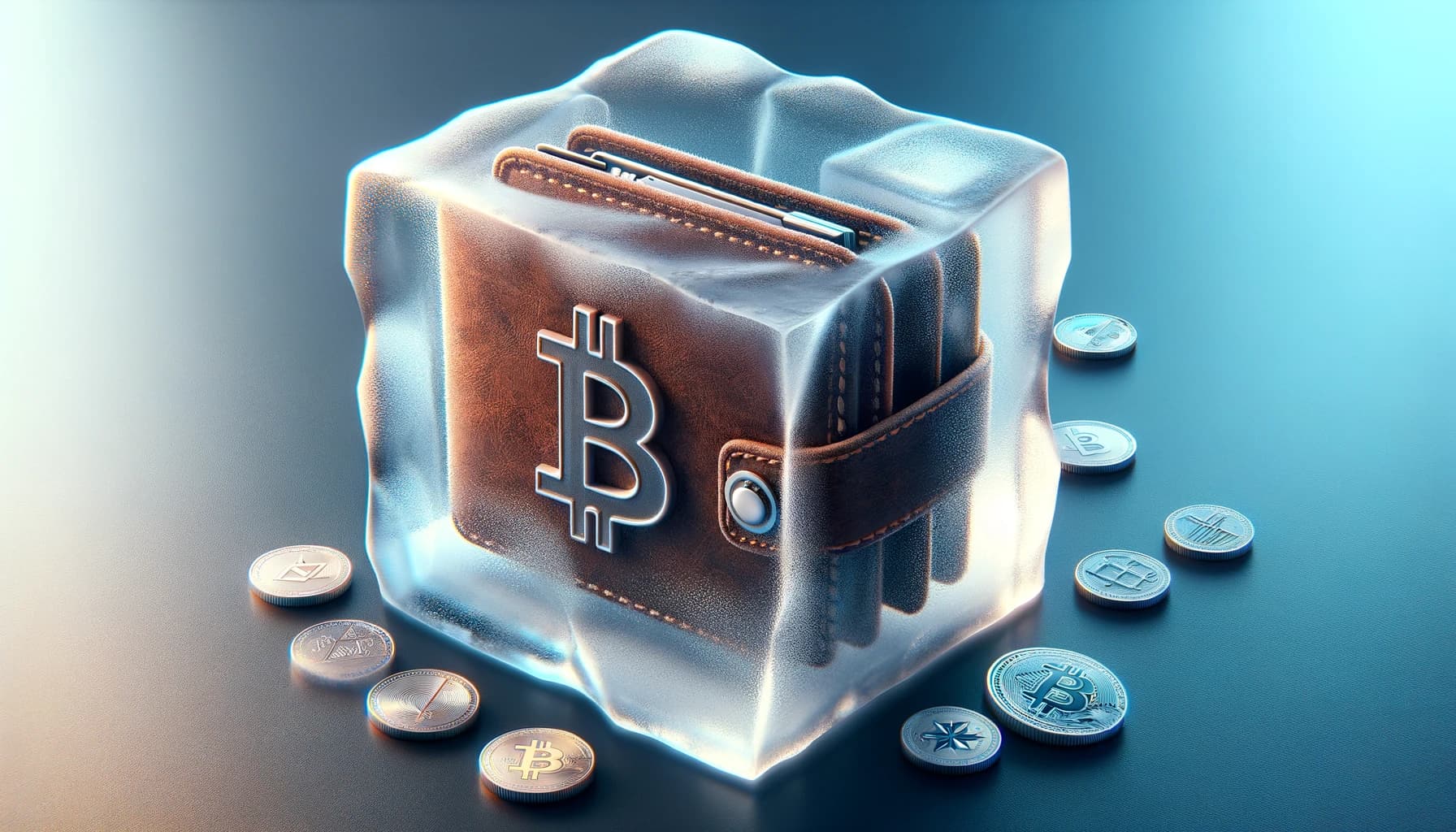Cold Storage Wallet Guide
Step into the realm of ultimate cryptocurrency security with our latest blog post: Cold Storage Wallet Guide. In a digital landscape fraught with security risks, cold storage emerges as the fortress of choice for safeguarding your precious crypto assets. But what exactly is cold storage, and how does it differ from other storage methods? Join us as we demystify the concept, explore various cold storage options, and equip you with the knowledge to protect your digital wealth like a seasoned pro. Let's dive in and ensure your crypto holdings remain safe and sound, even amidst the ever-evolving threat landscape.
In today's rapidly evolving world of digital currencies, ensuring the security of your crypto assets is of utmost importance. With the increasing frequency of cyber attacks and hacking incidents, it has become crucial for cryptocurrency users to adopt advanced security measures to safeguard their valuable investments. One such security measure is cold storage wallets.

Cold storage wallets are physical devices specifically designed to keep your cryptocurrencies offline, away from the internet, and therefore out of the reach of hackers. They offer an enhanced level of security and provide peace of mind to cryptocurrency enthusiasts who are concerned about the vulnerability of their digital assets.
In this section, we will provide an overview of the best cold storage wallets currently available in the market. Whether you're a seasoned crypto investor or just starting your journey, it is vital to choose a reliable and reputable cold storage wallet to store your cryptocurrencies securely.
This overview will serve as a comprehensive guide for individuals seeking solid and dependable options to protect their digital assets. By understanding the different features, pros, and cons of the best cold storage wallets, you will be able to make an informed decision based on your specific requirements and preferences. So, let's delve into the world of cold storage wallets and explore the top offerings in the market.
Explanation of cold storage wallets
Cold storage wallets are designed to provide an offline solution for secure storage of cryptocurrencies. Unlike software wallets, which require an internet connection and are susceptible to hacking attempts, cold storage wallets are impervious to such threats.
The main purpose of cold storage wallets is to safeguard cryptocurrencies by keeping them offline and away from potential vulnerabilities. By storing the private keys associated with the cryptocurrencies offline, cold storage wallets eliminate the risk of online attacks that software wallets are susceptible to.
There are two main types of cold storage wallets: hardware devices and paper wallets. Hardware devices like Ledger and Trezor are physical devices that store the private keys on a secure chip, requiring the user to physically connect the device to a computer or smartphone to access the cryptocurrencies. On the other hand, paper wallets involve printing the private keys or QR codes onto a physical piece of paper, providing a completely offline and secure storage option.
One of the key advantages of cold storage wallets is the enhanced security they offer. Since they are offline and not connected to the internet, they are significantly less susceptible to hacking attempts. Additionally, cold storage wallets provide a more affordable option compared to software wallets, which often require payment for their services.
Cold storage wallets provide a secure offline solution for storing cryptocurrencies and protecting them against hacking attempts. They can be in the form of hardware devices like Ledger and Trezor, or paper wallets. With their enhanced security and affordability, cold storage wallets are an ideal choice for individuals seeking a safe way to store their digital assets.
Importance of securing digital assets
In today's interconnected and technology-driven world, the importance of securing digital assets cannot be overstated. With the increasing reliance on digital platforms and the vast amount of personal and sensitive information stored online, protecting our digital assets has become a critical concern. From financial records and intellectual property to confidential business data and personal information, the potential risks associated with unauthorized access or misuse of digital assets are significant. Moreover, the rapid advancements in cyber threats and the increasing sophistication of hackers and cybercriminals make it crucial for individuals and organizations alike to prioritize the security of their digital assets. As the digital landscape continues to expand, understanding the importance of securing these assets has become an essential aspect of safeguarding our identity, privacy, and overall digital well-being.
What is a Cold Storage Wallet?
A cold storage wallet is a type of cryptocurrency wallet designed to securely store digital assets offline, providing an extra layer of protection against cyber threats. Unlike hot wallets, which are connected to the internet and susceptible to hacking, cold storage wallets keep private keys offline, making them impervious to online attacks.
The purpose of a cold storage wallet is to provide an offline solution for securely storing large amounts of cryptocurrency. By keeping the private keys offline, these wallets ensure that hackers cannot access the digital assets. This makes cold storage wallets ideal for long-term storage or for investors who want to keep their funds safe and secure.
There are two types of cold storage wallets: hardware devices and paper wallets. Hardware devices, such as Ledger and Trezor, are small devices that store private keys offline and require a physical connection to a computer for transactions. They are specifically designed to be resistant to hacking attempts.
On the other hand, paper wallets involve printing out the private keys on a physical piece of paper and securely storing it. Paper wallets provide an inexpensive and secure method of cold storage, as they are not connected to the internet. However, they require careful handling to prevent damage or loss.
Cold storage wallets offer an offline and secure solution to store large amounts of cryptocurrency. By keeping private keys offline, these wallets protect against hackers and cyber threats. Whether using hardware devices or paper wallets, cold storage wallets ensure the safety and security of digital assets.
Definition and purpose
The Definition and Purpose section serves as a brief introduction to the subsequent section, providing a concise explanation of what will be covered. Its purpose is to clarify the focus of the next heading and give readers an overview of the content they can expect to find in the subsequent section.
In this section, we will define and explain the main concepts and themes that will be discussed in the upcoming section. By providing a clear definition, we aim to establish a common understanding of the topic at hand. Additionally, we will delve into the purpose of the next heading, highlighting why it is important to explore this specific aspect of the subject.
This overview will help readers navigate through the subsequent section, allowing them to assess its relevance to their own interests or needs. By understanding the purpose of the next heading, readers can decide if they want to continue reading or jump to a different section that aligns more closely with their requirements.
Overall, the Definition and Purpose section offers a concise and informative preview of the content that will be covered, providing readers with a clear understanding of what to expect in the subsequent section. Through this clarification, readers can determine the relevance and value of the upcoming information, enhancing their reading experience and comprehension.
Differences between hot wallets and cold wallets
Hot wallets and cold wallets are two types of cryptocurrency wallets used to store digital assets securely. The major difference between them lies in their security features.
Hot wallets refer to wallets that store private keys online, making them easily accessible and convenient for everyday transactions. These wallets are often connected to the internet, which poses a potential security risk. Since hot wallets are online, they are more vulnerable to hacking attempts. Malicious actors can exploit security vulnerabilities in the system or employ sophisticated techniques to gain unauthorized access to the wallet and steal funds.
On the other hand, cold wallets store private keys offline, making them much more secure. Cold wallets are often physical devices, like hardware wallets or paper wallets, that generate and store private keys offline. This offline storage ensures that the keys are never exposed to the internet, significantly reducing the risk of hacking or unauthorized access. Cold wallets provide an extra layer of security by separating the private keys from any online connection.
In summary, hot wallets store keys online, providing convenience but increasing the risk of hacking, while cold wallets store keys offline, offering enhanced security. Therefore, those who prioritize security generally choose cold wallets for storing their valuable cryptocurrencies. It is important to consider the level of security needed when selecting a wallet and to ensure that proper precautions are taken to protect digital assets.
Benefits of using a cold storage wallet
When it comes to digital assets, ensuring their security and protection is of utmost importance. One highly effective method of safeguarding cryptocurrencies and other digital assets is by using a cold storage wallet. A cold storage wallet, also known as a hardware wallet or offline wallet, offers a myriad of benefits that enhance the overall security and peace of mind for cryptocurrency users. In this article, we will explore and discuss the various advantages that come with utilizing a cold storage wallet. From providing protection against hackers and online threats to offering offline storage and backup options, cold storage wallets are a must-have tool for anyone looking to securely manage their digital assets.
Types of Cold Storage Wallets
Cold storage wallets are a secure way to store cryptocurrencies offline and protect them from potential hacking or theft. There are two main categories of cold storage wallets: hardware cold wallets and paper cold wallets, each with its own features and advantages.
Hardware cold wallets are physical devices that store cryptocurrency private keys offline, making them highly secure. They come in two subcategories: electronic wallets and non-electronic wallets.
Electronic wallets are hardware devices that use a small OLED screen and physical buttons for navigation. They generate private keys offline and require manual confirmation for all transactions. This provides an added layer of security as the private keys never leave the device. Electronic wallets are portable, easy to use, and compatible with various cryptocurrencies. However, they can be vulnerable to physical damage or loss.
Non-electronic wallets, on the other hand, are physical devices that store private keys on engraved or etched metal plates. They are more resistant to physical damage and electronic hacking as they do not rely on firmware or software. Non-electronic wallets are highly durable and can withstand extreme conditions, but they may be less user-friendly and have limited cryptocurrency compatibility.
Paper cold wallets are an inexpensive and secure way to store cryptocurrencies offline. They involve printing out the private keys and storing them in a physical form away from hackers' reach. Paper cold wallets are not susceptible to electronic attacks and are highly secure when stored correctly. However, they can be easily damaged or lost if not handled carefully.
Cold storage wallets provide a secure method of storing cryptocurrencies offline. Hardware cold wallets, including electronic wallets and non-electronic wallets, offer different levels of convenience and vulnerabilities. Paper cold wallets, while inexpensive and highly secure, require careful handling to prevent loss or damage.
Hardware wallets
Hardware wallets are physical devices that offer a highly secure way to store and manage cryptocurrencies. They provide users with complete control over their private keys, which are essential for managing and accessing funds securely. Here are the pros and cons of hardware wallets, along with a basic guide for getting started with one:
Pros:
1. Enhanced security: Hardware wallets store private keys offline, mitigating the risk of online attacks such as hacking and phishing.
2. Protection against malware: Since private keys never leave the device, hardware wallets are immune to malware like keyloggers.
3. User-friendly: Hardware wallets are designed with simplicity in mind, making them accessible even for non-technical users.
4. Multi-currency support: Many hardware wallets support a wide range of cryptocurrencies, offering users flexibility in managing their digital assets.
Cons:
1. Cost: Hardware wallets come with a price tag, which may deter budget-conscious users.
2. Potential loss or damage: Like any physical device, hardware wallets can be lost, stolen, or damaged, potentially resulting in loss of access to funds.
3. Limited accessibility: In situations where immediate access to funds is necessary, hardware wallets may not be as convenient as software wallets.
Getting started with a hardware wallet:
1. Choose a hardware wallet: Research and select a reputable hardware wallet provider that meets your security needs and supports the cryptocurrencies you intend to store.
2. Purchase and set up the device: Follow the manufacturer's instructions to acquire and set up the hardware wallet.
3. Create a PIN and recovery seed: During the initial setup, you will be prompted to set a PIN and generate a recovery seed, which is crucial for restoring wallet access if the device is lost or damaged.
4. Install the wallet's software: Connect the hardware wallet to your computer or mobile device and install the designated wallet software.
5. Transfer your funds: Use the wallet software to securely transfer your cryptocurrencies to the hardware wallet's address.
6. Safely store your recovery seed: Write down the recovery seed provided by the hardware wallet and store it in a secure and offline location. Never share this information with anyone.
Remember, hardware wallets offer an unparalleled level of security for storing cryptocurrencies, but it's essential to follow best practices and keep backups of your recovery seed in case of emergencies.
Paper wallets
Paper wallets have been a popular choice for storing cryptocurrency due to their offline nature and enhanced security. However, they come with a set of drawbacks and risks that users should be aware of.
One significant drawback is their susceptibility to physical damage. Being made of paper, they can easily be torn, lost, or destroyed by various factors such as fire or water damage. Moreover, if the wallet gets misplaced or destroyed, there is often no way to recover the funds stored within it. This lack of recovery options can lead to a complete loss of the cryptocurrency.
Another limitation of paper wallets is their usability for frequent transactions. Each time a user wants to make a transaction, they need to import the private key from the paper wallet into a software wallet. This process can be cumbersome and time-consuming, hindering the seamless and frequent use of the cryptocurrency.
Additionally, during the creation of paper wallets, there is a potential risk of interception of the private key. If the process of printing the wallet is not secure or if the computer used for printing is compromised, an attacker may gain access to the private key. This can lead to theft of funds, putting the security of the cryptocurrency at risk.
In summary, although paper wallets offer enhanced security by keeping the private keys offline, they come with drawbacks and risks. These include the susceptibility to physical damage and loss, lack of recovery options, limitations for frequent use, and the potential interception of private keys during printing. It is crucial for cryptocurrency holders to weigh these factors before opting for a paper wallet as a storage option.
Offline wallet options
There are several offline wallet options available for individuals looking to secure their cryptocurrency. Offline wallets, also known as cold wallets, are considered one of the safest ways to store digital assets as they are not connected to the internet, thus minimizing the risk of cyberattacks and hacking. In this article, we will explore some of the most popular offline wallet options, their features, and how they provide an extra layer of security to ensure the protection of your digital wealth. Whether you are a beginner or an experienced cryptocurrency investor, understanding offline wallet options is crucial in safeguarding your assets and maintaining control over your financial future.
Setting Up a Cold Storage Wallet
Setting up a cold storage wallet is a secure method to store your bitcoin offline and protect it from potential online threats. To get started, follow these steps:
1. Offline Bitcoin Address Creation: Begin by generating an offline Bitcoin address. This address will serve as your cold storage wallet, as it is not connected to the internet. To create an offline address, you can use various methods like downloading an offline wallet generator or using a hardware wallet like Trezor or Ledger. These hardware wallets are popular choices for cold storage due to their robust security features.
2. Sending Bitcoin to the Cold Storage Wallet: After creating the offline Bitcoin address, you need to transfer your bitcoin to it. Open your regular online Bitcoin wallet and initiate a transaction to send bitcoin to your newly created offline address. Ensure that you double-check the address before confirming the transaction, as once sent, it is impossible to reverse.
3. Using the Multichain Bitcoin.com Wallet app: To effortlessly manage and monitor your cold storage wallet, consider utilizing the Multichain Bitcoin.com Wallet app. This app supports multiple cryptocurrencies and provides a user-friendly interface to view your offline Bitcoin address balance and transaction history securely. It also supports the import of other cold storage wallets like Trezor and Ledger, allowing you to conveniently access all your cold storage funds in one place.
Setting up a cold storage wallet ensures the utmost security for your bitcoin holdings, protecting them from potential online threats. By following the steps mentioned above and utilizing reliable tools like the Multichain Bitcoin.com Wallet app, Trezor, or Ledger, you can confidently secure your valuable digital assets.
Choosing the right type of wallet for your needs
When it comes to choosing the right type of wallet for your needs, there are several options available. Let's explore and highlight the benefits and features of each type, as well as their security and accessibility aspects.
Firstly, custodial wallets. These are wallets provided by third-party companies, such as exchanges, which store your funds on your behalf. The main advantage of custodial wallets is ease of use and convenience. However, the downside is that you do not have full control over your funds, as you are relying on the custodian to keep them secure.
Next, we have cold wallets. These are offline wallets that store your cryptocurrencies securely, away from any internet connection. Cold wallets include hardware wallets and offline software wallets. The main advantage of cold wallets is their enhanced security. As they are not connected to the internet, they are less vulnerable to hacking attempts. However, accessibility can be a trade-off as it may take longer to access and transfer your funds.
Lastly, physical paper wallets provide a paper printout of your private and public keys. They offer the highest level of security as they are completely offline. However, accessibility can be a challenge, as you need to keep the physical paper safe from loss, damage, or theft.
Each type of wallet offers different benefits and features. Custodial wallets provide convenience but sacrifice control. Cold wallets offer high security but may be less accessible. Physical paper wallets provide the utmost security but require careful physical storage. It is important to assess your priorities and choose the type of wallet that aligns with your specific needs.
Creating seed phrases for added security
In today's digital age, where data breaches and security threats are a constant concern, creating a strong and secure password is paramount. However, relying solely on a password might not be enough to protect your vital information. This is where seed phrases come in. Seed phrases are essentially a series of words that generate cryptographic keys used to secure your digital assets such as cryptocurrencies or encrypted messaging platforms. By using a seed phrase, you can add an extra layer of security to your sensitive data. In the following sections, we will explore what seed phrases are, how to create them, and why they are crucial for ensuring the safety of your online accounts. Whether you are a cryptocurrency enthusiast, a tech-savvy individual, or simply someone wanting to enhance their online security, understanding how to create seed phrases can greatly contribute to safeguarding your digital assets.
Security Features of Cold Storage Wallets
Cold storage wallets are designed to securely store cryptocurrency offline, providing a robust level of security from potential hacking attempts. One major security feature is their isolation from the internet. By not being connected to online networks, cold storage wallets are protected from remote attacks that can exploit vulnerabilities in internet-connected devices.
Protection against hacking attempts is another key feature. Cold storage wallets employ various mechanisms to ensure the safety of funds. They often use hardware devices, such as Ledger and Trezor, which are specially designed to store private keys securely. These devices are built with multiple layers of encryption and tamper-proof features, making it extremely difficult for hackers to gain access to the private keys.
A popular alternative to hardware wallets is paper wallets. These are essentially physical copies of public and private keys printed on paper, and they are stored offline. While paper wallets can be a cheaper option, they require careful handling to avoid damage or loss.
Cold storage wallets provide an extra layer of protection by keeping private keys entirely offline. Private keys are the essential means through which cryptocurrency is accessed and transacted. By storing these keys offline, cold storage wallets minimize the risk of theft and unauthorized access, rendering them more resistant to hacking attempts.
Cold storage wallets offer a variety of security features, including isolation from the internet, protection against hacking attempts, and the use of hardware devices or paper wallets. These features, combined with the offline storage of private keys, make cold storage wallets a highly secure option for cryptocurrency holders.


